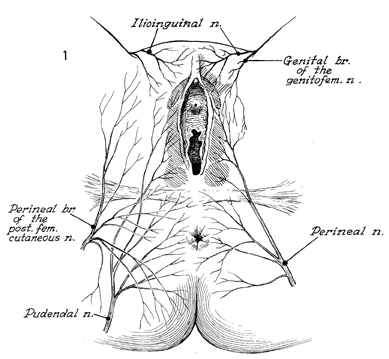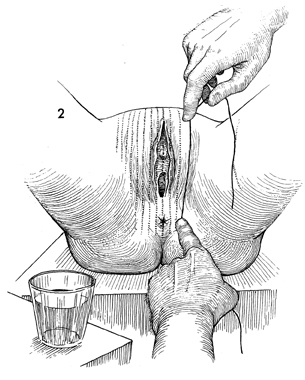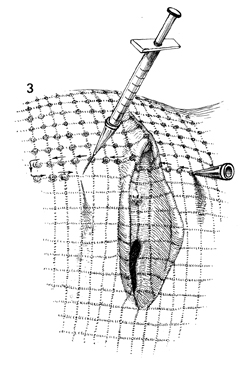|
||||||
Bartholin's Gland Cyst Marsupialization Excision of Vulvar Skin, with Split-Thickness Skin Graft Vaginal
Outlet Closure of Wide Local Excision of the Vulva Wide
Local Excision Alcohol
Injection Cortisone
Injection Excision
of the |
Alcohol Injection of the Vulva In patients with chronic and severe pruritus of the vulva not amenable to steroid cream therapy, denervation of the vulva is often needed to break the vicious cycle of itching, scratching, excoriation, micolacerations, and irritation of cutaneous nerves. Alcohol injection of the vulva gives the patient a temporary period of denervation. Surgical denervation should be reserved for those patients in whom medical therapy and alcohol injection have failed. Denervation by alcohol injection requires an understanding of the innervation of the vulva. To prevent microulcerations and infection, care must be taken to inject the 95% alcohol into the subcutaneous space and not the intradermal space. The purpose of this operation is to temporarily denervate the vulva by injecting alcohol in a systematic fashion that will denervate each of the cutaneous branches of the ilioinguinal, genitofemoral, posterior femoral, and pudendal nerves. This denervation generally lasts 4-6 months. Physiologic Changes. Denervation of the perineum blocks the awareness of itching, thereby eliminating the need for scratching. Scratching produces microlacerations that become infected, producing more itching and thus, the vicious cycle. By stopping the itching and eliminating the scratching, this procedure allows the perineum to heal during the 4-6 months of denervation. Points of Caution. The alcohol must be injected subcutaneously, not subcuticularly, or sloughing of the epidermis will occur. Technique
|
|||||
Copyright - all rights reserved / Clifford R. Wheeless,
Jr., M.D. and Marcella L. Roenneburg, M.D.
All contents of this web site are copywrite protected.



